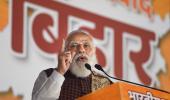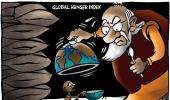At some stage this fall in the quality of life will begin to hurt anybody's popularity, observes Shekhar Gupta.

As a troubled 2020 came to an end, Prime Minister Narendra Modi should have some concerns.
India is looking worse than before on many key indicators, and we aren't referring to the pandemic year.
Why now, you might ask.
There is no particular reason to make an assessment of a government in its seventh year.
The next general election is three-and-a-half years away.
Nor is there any evidence of an itch rising in the voter's love affair with Mr Modi.
If Mr Modi and his party are winning every political battle, what are we complaining about?
The answer is, because there is more to leadership than popularity. And governance must be more than pure politics. Why now?
We didn't choose the timing.
It chose itself. Data points, survey findings, global ratings and rankings have been raining lately.
And these give us a pretty good idea of what this government has achieved or squandered well into its seventh year now.
The latest, of course is the government's own data, from National Family Health Survey (NFHS) 5, Phase 1.
It is ugly on almost all parameters.
The latest Human Freedom Index report is out, and rudely demotes India 17 places, from 94 to 111.
Again, you can't dismiss this as the work of anti-Modi/India/Hindu, 'Left-infested' foundations.
Because this survey is conducted by the Cato Institute in Washington, which is as far from the Left as Mukesh Ambani might be from Pinarayi Vijayan.
One of the leading scholars on its rolls is also Swaminathan Anklesaria Aiyar.
He has already backed the agriculture reform laws, possibly even more strongly than I.
Plus, he writes better.
The Human Freedom Index arrives at the rankings after assessing 76 parameters.
These include mainstream factors such as the rule of law, security and safety, freedoms of religion, association and civil society activity, expression and information, quality of regulation and, oops, size of government.
Remember, minimum government?
Nobody expected India to be in the top rankings, but an improvement was a fair expectation.
The opposite has happened.
It's a bummer to be beaten on the freedom index (including freedom to do business) by Bolsonaro's Brazil, Mexico, Cambodia, Bolivia, Nepal (at 92, 19 places ahead of us), Sri Lanka (94th), Zambia, Haiti, Lebanon, even Lukashenko's Belarus, Senegal, Mozambique, Lesotho, Uganda, Malawi, Madagascar, Bhutan (108), and Burkina Faso.
Remember its capital Ouagadougou, which Narasimha Rao chose to make his Kashmir peace offer from, probably because Chandraswami found that to be astrologically the most perfect spot in the world.
We might still have the joy of being substantially ahead of Pakistan and Bangladesh, but that is the equivalent of the loser's joy of winning the 'wooden spoon'.
In fact, we are one step ahead of our old friend, Putin's new Russia.
Remember Kazakhstan, that the Borat series of films has painted to be such an authoritarian dump? It is at 75.
Thirty-six places ahead of India.
The 2020 rankings are for 2018, so don't blame the pandemic.
And the higher rank of 94 was in 2019, based on the 2017 data.
Hold your breath now as we figure out how our ranking has moved since 2013.
It was 75 for the years 2008-12, 87 for 2013, 102 for 2015, 110 for 2016, improved to 94 in 2017, but has now collapsed to 111 for 2018.
Plot this on a graph against politics.
The Global Economic Freedom Index, released in September, had India slide from 79 to 105.
That is, 26 places down.
Canada's Fraser Institute leads this too, and is by no means Left-wing.
In October, globally respected democracy watchdog Freedom House released its Internet Freedom Index and India marked a third consecutive year of decline, having registered the largest number of internet shutdowns in the world.
The annual UNDP Human Development Report doesn't bring India any joy, either.
If anything, we have fallen two places to 131.
But, over the past three years, we've been laggards, our rankings being 130, 129, and now 131.
In its seventh year with a full majority, we should have expected much better.
Are we cherry-picking data? These are the only globally valued surveys and rankings we have seen lately.
And I am not even listing the one I do not take so seriously, the RSF ranking of 142 (down 2) on Press Freedom.
While the press surely has challenges in India, how a survey ranks Myanmar, South Sudan, the UAE, Sri Lanka, Tanzania, and even Afghanistan, where a brave journalist is unfortunately killed like once in a week ahead of India, beats me.
So, I leave it there.
But not the Global Hunger Index.
That is also scientific, peer-reviewed research.
India is 94 this year compared to 102 the last year.
But hold, the field has reduced by 10, from 117 nations to 107 this year.
Ten nations out, eight ranks up, you are either where you were or a little lower.
The Global Hunger Index, however, has one problem.
The word 'hunger' is a misnomer here. Because this isn't about whether you go to sleep on an empty belly or not, but mostly about nutrition. Which brings us to our central argument.

Our argument had started with the data of the latest National Family Health Survey (NFHS-5).
The Global Hunger Index has consistently seen India struggling despite the largest food security programme in the world.
But it is not about food grain, roti-rice, or a full belly.
It is about nutrition. That's where the NFHS holds up a mirror to us. And what we see is ugly.
It indicates that for the first time since 1998-1999, India has reversed the virtuous curve of declining child malnutrition.
This is Phase-1 of the survey and some major states will feature in the second.
But the picture we see is bad enough across major states, Kerala, Gujarat, Maharashtra, Karnataka, West Bengal, where our children under five show more stunting, wasting and underweight status.
It gets worse. In most, the number of overweight children has risen.
Now, how can our children be getting feebler and fatter at the same time?
A lot of Modi critics would be reading this with a sense of gotcha! See, Mr Modi is faking all his claims and figures, on the Swachh Bharat Mission, National Nutrition Mission, and so on.
Be prepared for disappointment.
The survey shows a distinct improvement in sanitation and also notes that the ICDS (Integrated Child Development Scheme) has improved in range, reach, and delivery.
What's gone wrong then?
Over the past five years our economic growth rate has slowed.
At the poorer levels of our population, this must be more pronounced.
So, families have less and less surplus for nutritious foods: Milk, poultry, meat, pulses, vegetables, and fruit.
Read the NFHS results therefore with the Global Hunger Index's and it makes sense.
Finally, we need to explore why such a paradox has come about.
We also acknowledge that the Modi-BJP combination is continuing to sweep elections.
It can only be reconciled if you accept that Modi/BJP have dehyphenated their vote catching appeal from economic growth.
Nationalism, religion, Mr Modi's personal popularity, and the lousy Opposition are enough to keep winning. The data now is a warning.
Because at some stage this fall in the quality of life will begin to hurt anybody's popularity.
And remember, while you might trash everything else as motivated, or blame the Congress's '70 years', the children the NFHS surveyed were all under-5.
They were all born under the Modi government's watch and the survey concluded well before the pandemic.
There's no place to hide now.
By Special Arrangement with The Print
Feature Presentation: Aslam Hunani/Rediff.com












 © 2025
© 2025